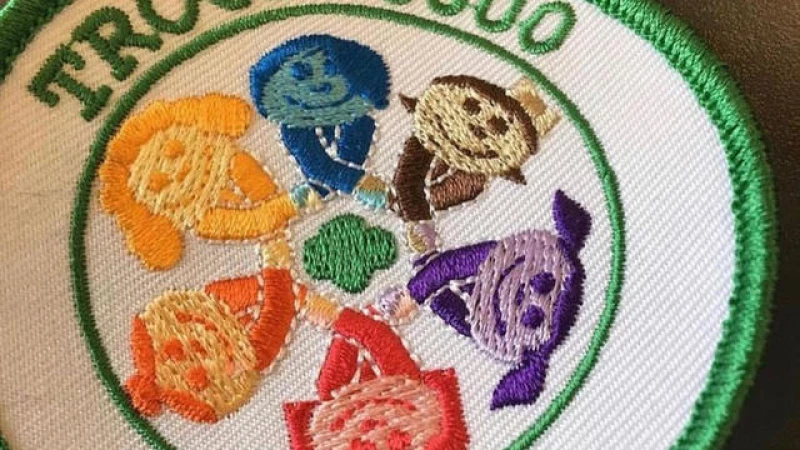Once a week in a midtown Manhattan hotel, dozens of Girl Scouts gather in a spare room made homey by string lights and children's drawings. They earn badges, go on field trips to the Statue of Liberty, and learn how to navigate the subway in a city most have just begun to call home.
They are the newest members of New York City's largest Girl Scout troop. And they live in an emergency shelter where 170,000 asylum seekers and migrants, including tens of thousands of children, have arrived from the southern border since the spring of 2022.
As government officials debate how to handle the influx of new arrivals, the Girl Scouts — whose Troop 6000 has served kids who live in the shelter system since 2017 — are quietly welcoming hundreds of the city's youngest new residents with the support of donations. Most of the girls have fled dire conditions in South and Central America and endured an arduous journey to the U.S.
What is Troop 6000?
Girl Scouts Troop 6000, initiated by the Girl Scouts of Greater New York in 2017, is a program designed for girls residing in the New York City Shelter System. In December 2023, there were 21,774 families living in the city's homeless shelters, with 33,399 being children, as reported by the Coalition for the Homeless.
Recently, Troop 6000 established its latest branch at a hotel-turned-shelter in Midtown Manhattan, one of the city-funded relief centers for migrants. Despite numerous families staying at the shelter each night, the Girl Scouts is the sole children's program available.
Unwavering support amidst anti-immigrant sentiment
In January of last year, the Girl Scouts expanded the Troop 6000 program to cater to over 100 young newcomers residing in the New York City Humanitarian Emergency Response and Relief Center, as stated in a press release during that period. The organization commenced recruitment at the shelter and introduced a bilingual curriculum to aid scouts in learning more about New York City, including its landmarks, subway system, and political boundaries.
A year later, with close to 200 members and five parents serving as troop leaders, the shelter stands as the largest among Troop 6000's approximately two dozen locations throughout the city, and it is the only one exclusively dedicated to asylum-seekers.
Not everyone is pleased with the progression of Troop 6000. In the midst of escalating anti-immigrant rhetoric and an upcoming contentious election, some donors believe that the Girl Scouts are delving too deeply into politically sensitive territory. Nevertheless, the group, along with their dedicated supporters, remains unfazed. In the face of city budget reductions and a rising demand for services, they stand alongside numerous charities asserting that their commitment to all New Yorkers, including newcomers, is more crucial than ever.
"There are donors who would rather see their contributions directed elsewhere," stated Meridith Maskara, CEO of the Girl Scouts of Greater New York. "I am frequently questioned: Isn't this becoming too political?"
Despite encountering opposition, Troop 6000 has garnered significant backing from sympathetic individuals. "If it pertains to young girls in New York City, then it transcends politics," Maskara affirmed. "It's our duty."
With limited alternative after-school options, the girls are eager for additional opportunities to engage, noted Giselle Burgess, senior director of the Girl Scouts of New York's Troop 6000.
New York City, charities under financial strain
New York City has invested billions in asylum seekers while grappling with an ongoing housing and affordability crisis. This has left little room to engage and coordinate with the city's major philanthropic organizations.
"It's extremely challenging to pause when you're overwhelmed," expressed Beatriz de la Torre, chief philanthropy officer at Trinity Church Wall Street, which provided the Girl Scouts with a $100,000 emergency grant — in addition to $150,000 in annual backing — to aid in the expansion of Troop 6000.
Amidst the growing needs of charities, food banks are struggling to meet the demand for food and legal clinics are in need of more lawyers.
Since the influx of asylum-seekers to the city, a coalition of around 30 local grant makers, including Trinity Church and Brooklyn Org, have been meeting biweekly to address the escalating needs of their grantees.
Collectively, they have contributed over $25 million to support charities that serve asylum seekers, offering services such as free legal aid and assistance in navigating the public school system.
"The government may not always be able to respond swiftly - this is where nonprofits and philanthropy play a crucial role," stated Eve Stotland, senior program officer at New York Community Trust. The trust leads the Working Group for New York's Newcomers and has allocated over $2.7 million in grants to support recent immigrants.
"These individuals are our community members," emphasized Stotland. "For funders striving to enhance the quality of life in New York City for all, this includes supporting newcomers."







